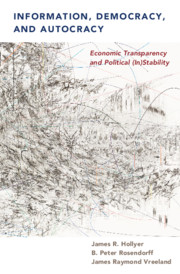Propaganda in Autocracies
A dictator's power is secure, the authors begin in this muscular, impressive study, only as long as citizens believe in it. When citizens suddenly believe otherwise, a dictator's power is anything but, as the Soviet Union's collapse revealed. This conviction – that power rests ultimately on citizens' beliefs – compels the world's autocrats to invest in sophisticated propaganda. This study draws on the first global data set of autocratic propaganda, encompassing nearly eight million newspaper articles from fifty-nine countries in six languages. The authors document dramatic variation in propaganda across autocracies: in coverage of the regime and its opponents, in narratives about domestic and international life, in the threats of violence issued to citizens, and in the domestic events that shape it. The book explains why Russian President Vladimir uses Donald Trump as a propaganda tool and why Chinese state propaganda is more effusive than any point since the Cultural Revolution.
- Offers new insights into how repressive governments maintain power, and what we can infer about those governments from what they tell their citizens
- Documents dramatic variation in propaganda across autocracies: encompassing over eight million newspaper articles from 59 countries in six languages
- Explains the uses of propaganda during major historical events such as Russian President Vladimir Putin's use of Donald Trump as a propaganda tool and why the Chinese Communist Party's (CCP) flagship propaganda newspaper is more positive than at any point since the Cultural Revolution
Reviews & endorsements
‘Informing (and misinforming) citizens to make them believe in the unassailability of autocratic rule is one of the fundamental chores of any tyrant. Employing an astonishing wealth of data and ingenious methods, Propaganda in Autocracies reveals when, how, and with what consequences autocracies do that. This is an amazing book, soon to be seen as a classic in the literature on authoritarianism.’ Carles Boix, Robert Garrett Professor of Politics and Public Affairs, Princeton University
‘When autocrats speak, few people like it and fewer believe what they hear. But everyone knows they’d better listen. So I wouldn’t miss Propaganda in Autocracies, Erin Baggott Carter and Brett Carter’s extraordinary, systematic analysis of the most extensive global collection of autocratic propaganda ever constructed. I expect researchers will be building on this work for decades.’ Gary King, Weatherhead University Professor, and Director of the Institute for Quantitative Social Science, Harvard University
‘In this work of audacious scope, brilliant methodology, and profound insight, Erin Baggott Carter and Brett L. Carter restore the struggle to shape citizens’ beliefs to a central place in the comparative politics of authoritarianism. With mountains of compelling logic and evidence, they show how autocrats who face electoral constraints must - at some risk - use propaganda more credibly to persuade rather than dominate. Propaganda in Autocracies is a work of prodigious research and lucid theorizing that is indispensable to understanding the contemporary dynamics of authoritarian rule.’ Larry Diamond, Mosbacher Senior Fellow in Global Democracy, Freeman Spogli Institute of International Studies Stanford University
‘The literature on authoritarian rule typically considers elections, repression, and propaganda as disparate tools of staying in power. In this path-breaking work, Carter and Carter link them together and show that the degree of electoral competition and repression capacity affected how autocracies deployed propaganda. Weaving together a massive data set on propaganda, the latest methodologies in textual analysis and survey experiments, as well as deep knowledge of a number of authoritarian regimes, this book tells a compelling story of the strategic use of propaganda to convey credibility or menace as these regimes saw fit.’ Victor Shih, Ho Miu Lam Chair and Associate Professor in China and Pacific Relations, School of Global Policy and Strategy, University of California, San Diego
‘Scholarly and empirically robust, this volume opens new ground in the theory of propaganda studies and the politics of belief. Comprehensive in reach, the authors include a wide range of comparative examples, including North Korea, Congo, Russia, China, Uzbekistan, Uganda, Iran, and the United States, along with many others … Highly recommended.’ A. R. Brunello, CHOICE
‘Scholars interested in how propaganda works as a hallmark of authoritarian rule will want to keep this book close at hand.’ Haifeng Huang, Comparative Politics
‘Overall, this is a rich book with impressive data and many astute observations. It contributes to the literature on propaganda both by validating previous findings about hard and soft propaganda using a global dataset, and by offering and testing a series of interesting hypotheses about several under-explored topics. While not every finding is conclusive, the book does raise important and intriguing questions that future research can follow up on. Scholars interested in how propaganda works as a hallmark of authoritarian rule will want to keep this book close at hand.’ Perspectives on Politics
Product details
September 2023Paperback
9781009271233
350 pages
228 × 152 × 32 mm
0.82kg
84 b/w illus. 52 tables
Available
Table of Contents
- Part I. Foundations:
- 1. Persuasion and domination
- 2. A theory of autocratic propaganda
- 3. A global dataset of autocratic propaganda
- Part II. The Political Origins of Propaganda Strategies:
- 4. The politics of pro-regime propaganda
- 5. Narrating the domestic
- 6. Narrating the world
- 7. Threatening citizens with repression
- Part III. The Propaganda Calendar:
- 8. The propagandist's dilemma
- 9. Memory and forgetting
- Part IV. Propaganda, Protest, and the Future:
- 10. Propaganda and protest
- 11. Conclusion
- List of figures
- List of tables.






